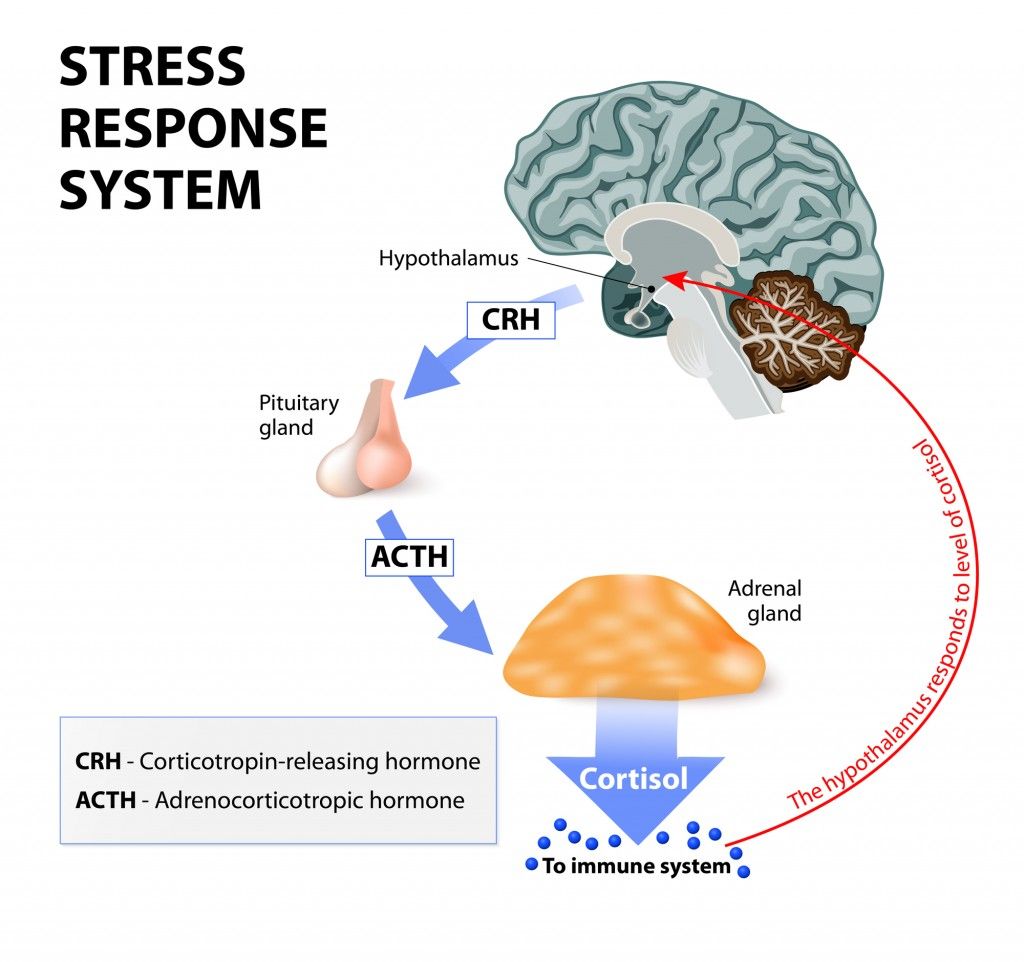HPA-Axis Dysfunction
Health, November 26, 2017
These three components - Hypothalamus, Pituitary gland, and adrenal glands, work in symphony to regulate important functions. This article discusses how they all interact. I've used Ben Greenfields book "Beyond Training - mastering Endurance, Health, and life" for basis of the article.
1) Hypothalamus (in your forebrain)
2) Pituitary gland (below the hypothalamus)
3) Adrenal Glands (top of the kidneys)
This HPA-axis work together to regulate the stress response, digestion, mood, your immune system, metabolism, libido, and energy.
This is a list of some of the chemicals that the HPA-axis depends on
1) Corticotropin-releasing hormone (CRH) - also called CHF for factor. This hormone is produced and released by the hypothalamus responding to stress. It then stimulates the pituitary gland to release adrenocorticotropic hormone (if the body is stressed the more of this is produced).
2) Adrenocorticotropic hormone (ACTH) - This is released from the pituitary and works on the kidney to stimulate the adrenal glands to produce glucocorticoids.
3) Glucocorticoids - these are steroids produced in the adrenal glands that regulate metabolic rate, your immune response, and inflammation. The most well known one is cortisol.
4) Cortisol - this prepares your body to withstand stress (injury, lack of sleep, excessive anxiety or exercise, depression) by stimulating nor-adrenaline to kick start your sympathetic system eg flight or flight.
The entire HPA axis is on a feedback loop. A +'ve loop increases the output, a -ve feedback loop decreases it. In healthy people who have stress under control the whole HPA -axis loop works in harmony, but if cortisol and noradrenaline are overproduced chronically the HPA-axis can become desensitised leading to chronic stress on the hypothalamus, pituitary gland, and adrenal glands. Eventually leading to neural failure causing adrenal fatigue issues.
Four ways to rebalance your HPA-axis Dysfunction.
1) Protect yourself (Destress)
Get into good habits to protect yourself from chronic stress. If something is causing you stress - Don't just complain about it - change it! Go to bed early so you don't have to RUSH in the morning, go for a lunch time walk and breath deeply, avoid interacting with "negative" people frequently. Hook into your meditation practice to "rev up" your parasympathetic (rest and digest) nervous system. Recognise the signs, and don't abuse your body - your mind and soul will be better off. Then you will get more adaptation and improvement in your training.
2) DON"T overtrain.
This is the quickest route to to HPA-axis dysfunction. The symptoms are brain fog, irritability and mood issues. Make sure your training programme blends in with your life to ENHANCE it rather than pile on more stress. This might create some short term performance gains but it's NOT sustainable and EVERFIT is all about creating an enhancing environment for you to consistently strive to be better. Energy levels can be difficult to track. The trick is to be able to distinguish between low motivation from being under recovered OR low motivation from non-physical factors such as laziness or a mentally stressful day at work. A good way to gauge this is to start the workout, if you get through the workout and you are still tired then you are probably under-recovered and you might get more benefit having and EASY session or skipping it all together. You must think LONG TERM CONSISTENCY and WELLNESS rather than short term performance and digging yourself a hole.
3) STOP ongoing Inflammation
Decreasing your daily inflammation load is a great way of getting the HPA axis back in balance.researches have shown with mice experimentation that decresing a protein involved with inflammation in the hypothalamus called NF-kB (by switching it off) the mice lived 20% longer. On the other side of the coin when NF-kB is increased it accelerates aging, decreases another brain protein called GnRH. When less of this is present then less new brain cells are created and aging is further accelerated. Elevated cortisol levels also cuase systemic inflammatioin further aggravating the HPA axis. To help with this increase your intake of anti-inflammatory foods (plant based foods eg Tomatoes, leafy greens, fruits (strawberries, blueberries, oranges, cherries), walnuts, almonds - real, whole food the way nature intended). Try and decrease or eliminate pro inflammatory foods (red meat, processed meat, fried food, soda drinks, highly processed food). Another great way to halt inflammation is taking cold showers and cold swimming. For further information check out my article on PLANT POWER and GETTING COLD to RUN fast on the platform.
4) SLEEP
Sleep is imperative to the body repairing itself, especially during the deep sleep stages between 2-6am (coinciding when the body temp drops). Sleep is the main building block in protecting your HPA-axis, without it you will never fully recover. It is the single most important thing to do to enhance your mental function. Waking up earlier than usual consistently could indicate the early stages of adrenal fatigue, while waking much later than usual could indicate the later stages of adrenal fatigue. Most specialists recommend 7-9 hrs a night. I would prioritise more during big blocks of training or following a big session to allow the body to adapt. Aiming for 5 x 90min sleep cycles a night or 35 in a week is another way of making sure you are consistently working on your sleep hygiene. If you would like more reading on the subject check out my SLEEP article on the platform.

.jpg?version=8)